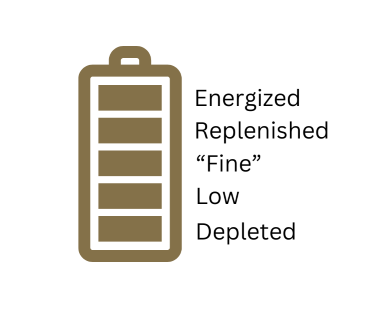
Please note that I am not a therapist or physician. The tips and insights shared here are based on evidenced based practices and my personal experiences and training as a health and wellness coach specializing in behaviour change. The tips are offered in service of moving towards our health and wellness goals by bringing awareness to our emotional body’s connection to our physical health. This content is for informational purposes only and is not a substitute for professional medical advice, diagnosis, or treatment. Always seek the advice of your physician or other qualified health providers with any questions you may have regarding a mental health or medical condition.
“The best and most beautiful things in the world cannot be seen or even touched. They must be felt with the heart”
― Helen Keller
It’s a myth that emotions don’t affect physical health. You can think of your emotional state as a battery. When it’s low, everything from your mood to your productivity takes a hit. Understanding and managing your emotional battery level is crucial for supporting your energy throughout the day and choosing the behaviours that serve your daily routine and long-term goals.
Unseen but powerful, our emotions and our thoughts have a two-way dialogue that shapes our behaviours and decisions and affects our health in ways we’re just beginning to understand. Imagine your emotional well-being not just as a state of mind, but as a key player in your physical health, influencing everything from your heart’s rhythm to your immune system’s vigilance.
Recognizing when your emotional energy is depleted is more than just self-awareness; it’s a vital health practice. The latest science on emotions, both positive and negative, shows that our emotions profoundly affect our physical state, our thought patterns, energy levels, and even our decision-making abilities. More critically, storing unprocessed emotions in the body does not just weigh on your mind—it can manifest as physical symptoms, from fatigue to chronic illness, illustrating the deep connection between emotional well-being and physical health. Understanding this link is the first step toward healthier decisions, better stress management, and, ultimately, a more balanced life.
Signs that your emotional battery might be running low and are heading towards burnout are:
- Delaying tasks, not out of laziness, but due to a lack of emotional energy.
- Struggling to make decisions, even minor ones, because every choice feels overwhelming.
- Quick to anger or frustration over minor issues that usually wouldn’t bother you.
- Pulling back from social interactions, hobbies, or activities you typically enjoy.
- Feeling constantly tired or drained, even after rest.
- Increased feelings of anxiety or worry over situations or outcomes you usually would easily handle.
- Skipping meals, exercise, or other self-care practices because they feel like too much effort.
- Feeling detached or indifferent, lacking joy or sadness in situations that normally elicit an emotional response.
- Using food as a comfort or losing appetite due to emotional distress.
- Experiencing insomnia, oversleeping, or having unrefreshing sleep.
- Developing or worsening physical symptoms, such as headaches, stomachaches, or other stress-related ailments.
- Pessimistic thinking or feeling like things won’t improve.
- Lack of motivation to pursue goals, work, or engage in previously rewarding activities.
- Persistent self-doubt and feelings of not being good enough.
Recognizing these signs in yourself can be the first step towards replenishing your emotional reserves. Navigating the intricate relationship between our emotional well-being and physical health is a journey of balance and understanding. The way we manage our emotional energy not only shapes our mental health but also has a significant impact on our physical vitality. This connection, deeply rooted in the mind-body interaction, underscores the importance of adopting a holistic approach to wellness. It’s through this lens of interconnectedness that we can approach our health holistically, recognizing that nurturing our emotional state is as crucial as taking care of our physical body.
The Book The Body Keeps the Score by Bessel van der Kolk offers valuable insights into how emotional stress and trauma are stored in the body, affecting our overall well-being and health. This work underscores the critical need for addressing and processing these emotions to heal both mind and body.
Five tools, strategies and lifestyle interventions that help support emotional wellness and improved energy
Boundary Setting:
Setting boundaries is a crucial practice for safeguarding your emotional energy. Boundaries can indeed be both internal and external. Internal boundaries relate to the limits and standards we set for ourselves, guiding our own behaviour, thoughts, and emotions. These are about how we interact with ourselves and maintain our personal values, morals, and well-being. External boundaries, on the other hand, are the limits we set with others, determining how we allow others to treat us and interact with our space, time, and energy. Learning to establish and maintain both types of boundaries is crucial for our health and relationships (Psychology Today).
Ways to set internal boundaries that support emotional and physical energy include:
- Adequate sleep, regular work breaks, and recovery time are foundational to pursuing your day-to-day goals at your best. Prioritize and set firm boundaries around sleep and recovery. Taking breaks during the day to engage in a personally fun activity, taking a short walk or getting out into nature also allows you to recharge and keep your emotional reservoir full.
- Recognize the areas of your health where you feel out of balance and set realistic goals and limits that allow you to meet your needs and not overextend yourself. Measure success towards your goals based on progress rather than on completing specific tasks. This approach helps alleviate the disappointment and shame often associated with not accomplishing everything we would like to in a day. Emphasizing progress over perfection encourages a healthier relationship with oneself and helps foster self-compassion, acknowledging our positive behaviours even in the face of challenges.
- Implementing time blocking, where you allocate specific, reasonable time slots for completing priority tasks, can improve productivity and prevent tasks from unnecessarily expanding to fill your entire day. This approach harnesses the principle that work often swells to fit the time available for its completion, known as Parkinson’s Law. By setting clear limits, you not only ensure focused effort but also mitigate stress and boost productivity, effectively controlling the expansion of tasks and making your time management more efficient.
Mindfulness and Emotional Awareness Strategies
Mindfulness strategies such as journaling, breathwork, or meditation allow for insights into our inner dialogue, enabling us to recognize and understand our emotions more clearly. This self-awareness can lead to better management of our emotional energy, preventing depletion and fostering a sense of balance. Our relationship with ourselves and recognizing our emotional landscape sets the foundation for every aspect of our lives. It’s about the dialogue we keep internally, how we support, criticize, or nurture our own needs and aspirations. This self-relationship determines our confidence, resilience, and the ability to engage positively with the world around us.
Validate Emotions; Don’t Suppress or Minimize
The “name it to tame it” strategy in emotional health is a powerful tool for managing overwhelming feelings. By identifying and labelling our emotions, we engage the brain’s rational parts, where we can then use self-reflection to validate our emotions and gain perspective over our emotional responses. The “feeling wheel” such as the one from the Gottman Institute is a great tool for communication or journaling about what we feel. This strategy allows us to step back, recognize what we’re feeling, and approach our emotions with greater curiosity and control. In practice, it’s about acknowledging, “I’m feeling anxious right now,” or “This is frustration,” which can instantly make these emotions more relatable and allow us to take more conscious action or develop tools for dealing with specific emotions. This approach not only aids in emotional regulation but also empowers us to navigate our emotional landscape with increased awareness and resiliency, releasing what no longer serves our well-being.
Look for the Positives
Set a daily intention to look for the positives, what is going well and express gratitude. Peace of mind doesn’t come to us once all of our problems are solved, or everything we want is perfectly in place. Think of your brain as a muscle; the areas you exercise grow stronger. The process where focus and practice can physically alter the brain is known as neuroplasticity. By dwelling on negative thoughts, we strengthen those neural pathways, making pessimism more automatic. While we don’t want to dwell on the negative for too long, we also don’t want to ignore or suppress them. However, we can acknowledge their presence and actively challenge them as “just thoughts” that don’t dictate who we are or our innate worth. Conversely, when we consistently seek out positives, we bolster the parts of our brain associated with optimism and happiness. This active engagement in positive thinking and recognizing that we are not the sum of our thoughts not only shifts our daily experiences but also fundamentally transforms our brain’s structure. When practiced over time will lead to increased resilience against stress and a more profound sense of well-being.
Create a Support Network
Whether it’s turning to friends, family, support groups, mentoring circles, or professionals like therapists or health and wellness coaches, reaching out is a vital part of navigating life’s challenges that can help recharge our emotional state and improve energy levels. These support networks offer different perspectives, emotional comfort, and practical advice, making the journey less isolating. There is no shame in seeking support for personal or professional goals. It’s a proactive approach to taking charge of your emotional and physical health.
In summary, understanding the intricate dance between our emotional and physical health opens new doors to wellness. Yet, it’s crucial to remember that experiencing persistent fatigue or any other concerning symptoms shouldn’t be brushed aside as mere byproducts of stress or busy lifestyles. If you’re often feeling fatigued, it’s important to consult a doctor to address any underlying health issues and get the right support for both your physical and emotional well-being.
Regularly checking in on your emotional battery is crucial for supporting both mental and physical health. Take a moment each day to assess how you’re feeling and where you might need to recharge. Whether it’s stepping outside for fresh air, connecting with a friend, or seeking professional guidance, make conscious choices that replenish your energy. Taking care of your emotional well-being is a necessity for a balanced and fulfilling life. We’d love to hear how you support or boost your emotional energy levels—share your experiences in the comments below. Your journey could inspire others to find new ways to recharge and thrive.
Important Information: The information provided in this blog is for informational purposes only and is not intended as a substitute for professional medical or mental health advice, diagnosis, or treatment. While health coaching can support and enhance overall wellness, it is not a substitute for professional medical or mental health care. Always seek the advice of your physician or another qualified health provider with any questions you may have regarding a medical condition or health objectives. This blog aims to empower you with knowledge and tools to improve your general well-being and help you make informed decisions about your health, but it is not designed to replace professional medical or mental health services.
About the Author

Heather Budd is a National Board Certified Health and Wellness Coach, trained by the Functional Medicine Coaching Academy. She specializes in guiding individuals through lifestyle transformations to manage chronic illness and combat fatigue. With a diverse background in business, leadership and a profound personal health journey, Heather empowers clients to reclaim their health and extend their health span.